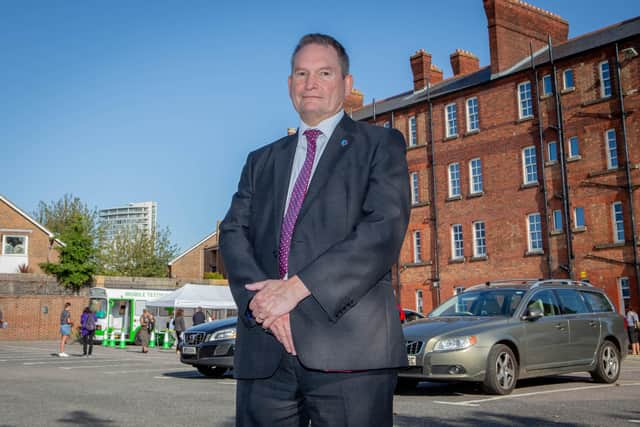Return date confirmed for University of Portsmouth students - three days after teaching year ends - as vice-chancellor savages Boris Johnson for treating students as 'second-class citizens'
and live on Freeview channel 276
Professor Graham Galbraith, vice-chancellor at the University of Portsmouth, launched a scathing attack on the government’s ‘cavalier’ approach to students during the pandemic after in-person teaching to students was abandoned after the country went into lockdown for a third time in January.
Professor Galbraith said it was ‘unfathomable’ that the majority of university students were only allowed to return on May 17 when schools and further education colleges resumed face-to-face teaching on March 8.
Advertisement
Hide AdAdvertisement
Hide Ad‘That this date is after many universities will have finished their teaching year shows a government with a cavalier disregard for details. This isn’t good enough,’ he wrote in an article published on the Higher Education Policy Institute’s website on Tuesday.
‘Student education has been disrupted, their term-time employment lost and they have been ordered not to occupy accommodation they have paid for.
‘Their wellbeing and mental health has suffered and they will almost certainly graduate into a very difficult economic climate.
‘They are entitled to expect that the government makes their interests a top priority as the country returns to normal. In refusing to permit in-person teaching students are being treated like second-class citizens.’


Advertisement
Hide AdAdvertisement
Hide AdThe professor went on to reject the view that university students are ‘irresponsible super-spreaders who need to be kept away from the rest of us’.
He said: ‘Throughout the pandemic the overwhelming majority of students have behaved very well and, like you and I, can now go to the pub, get a tattoo or drive cross-country for a self-catered holiday.
‘The only thing most cannot do is access in-person teaching – an activity that, as it occurs in highly managed Covid-secure environments, is far safer than almost anything else they can now do.
‘Even those convinced that students are feckless super-spreaders must accept that permitting in-person teaching will not materially increase the risk it is imagined students pose.
Advertisement
Hide AdAdvertisement
Hide Ad‘And any fear of a mass return of students to their university towns and cities is misplaced. The ONS estimates that about three-quarters of students are already at their term-time address. Any mass return has already happened and seems to have gone unnoticed.’
Professor Galbraith poured scorn on the government’s rationale for halting face-to-face teaching as merely ‘following the science’, with him claiming the assessment was in fact a mixture of ‘political, economic and social priorities’ that determined its decision.
‘For this government, it seems that university students’ education is a low political priority,’ he said.
‘Just how low is illustrated by the fact that despite mentioning beer, beer gardens, and pubs in his April 5 announcement on the country’s steps out of lockdown, the prime minister made no reference to students at all.’
Advertisement
Hide AdAdvertisement
Hide AdHe added: ‘Like everyone else students can be expected to make sacrifices in the pandemic – and they have. But as things improve, they can also expect the government to prioritise their educational and emotional needs. This has not happened.
‘Students can now buy a book on British history in Waterstones and discuss it with a tattoo artist while they have their body decorated, but they cannot do the same thing in a Covid-secure environment with their university lecturer. Prime minister, can we have our students back please?’
Paul Gerard, head of media and communications at the university, also mocked the announcement with a post on social media. He wrote: ‘Face-to-face teaching allowed for students three days after the teaching block (at the university) ends on May 14.’